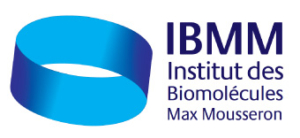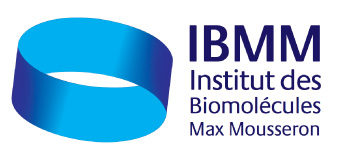The Max Mousseron Institute of Biomolecules
From molecule to drug – At the interface between chemistry, sustainable processes & biology
IBMM is nationally and internationally recognised for its work in the different classes of essential biomolecules: lipids, sugars, nucleosides and oligonucleotides, peptides and proteins, prebiotic molecules and biopolymers.
The grouping of research themes around major classes of biomolecules within the same Institute is unique in France, and even in Europe.
IBMM displays its skills for integrated research, with the aim of understanding the mechanisms of life by designing molecules and systems useful for biology, medicine, and agriculture while developing green chemistry processes.
MAIN RESEARCH AREAS
 Organic synthesis
Organic synthesis
Development of new reactions and processes, «economical» and environmentally friendly reactions, innovative technologies allowing access to biomolecules and biomaterials useful for health, the well-being of humans and their environment.
 Biomolecules
Biomolecules
Analysis and characterisation of biomolecules and biomaterials, as well as the study of their mechanisms of action and their involvement in physiopathological processes.
 Methodologies
Methodologies
in cellular and molecular pharmacology, toxicology, associated with molecular modelling and bioinformatics for the discovery and selection of new molecules and biomaterials for therapeutic purposes.
Search for new potential therapeutic targets involved in different diseases
Infectious diseases caused by emerging viruses (Ebolavirus, SARS-CoV 2 and 1, MERS coronavirus, Dengue virus and Zika), chemoresistant bacteria, parasites (malaria) and cancer.
AREAS OF USE
The applications of biomolecules cover a wide range of fields such as human and animal medicine, cosmetology, agri-food, veterinary industry and agrochemistry within a sustainable development framework.
AREAS OF RESEARCH AND EXPERTISE
- The search for new therapeutic targets involved in infectious diseases due to emerging viruses (Ebolavirus, SARS-CoV 2 and 1, MERS coronavirus, Dengue Virus, Zika), chemo-resistant bacteria, parasites (malaria), cancers, cardiovascular diseases and neurodegenerative diseases.
- The synthesis of more efficient and environmentally friendly biomolecules and derivatives.
- The design by molecular modelling and bioinformatics.
- The development of analytical methods for the characterisation of biomolecules and their analysis in biological media for the study of physiopathological processes.
- Pharmacological, toxicological and in vitro biological studies of these biomolecules to validate their properties and select the most promising ones for development into new therapeutic and diagnostic systems and devices.
- The study of molecular interactions, recognition phenomena to address the treatment of pathologies or the study of the mechanisms of action of ligands interacting with G-protein-coupled membrane receptors (GPCRs).
- The development of fundamental research, which has led to the marketing of two drugs (Macrilen, Sebivo) and the creation of 15 companies.


Keywords
Research, innovation in the synthesis, chemical reactivity, study of the physico-chemical, biological, pharmacological and toxicological properties of biomolecules.
Date and context of creation
IBMM was created in 2007 under the leadership of Professor Jean Martinez in order to bring together six research units recognized for their work in the different classes of essential biomolecules.
Director: Pr. Pascal Dumy since 2015
Number of employees: 320 people (190 permanent and 130 temporary)
Label: UMR 5247
Tutelles: CNRS/UM/ENSCM
16 teams – 1220 publications – 53 patents including 14 licences over 6 years – 60 contracts with private companies – 13 CIFRE supports in 6 years

